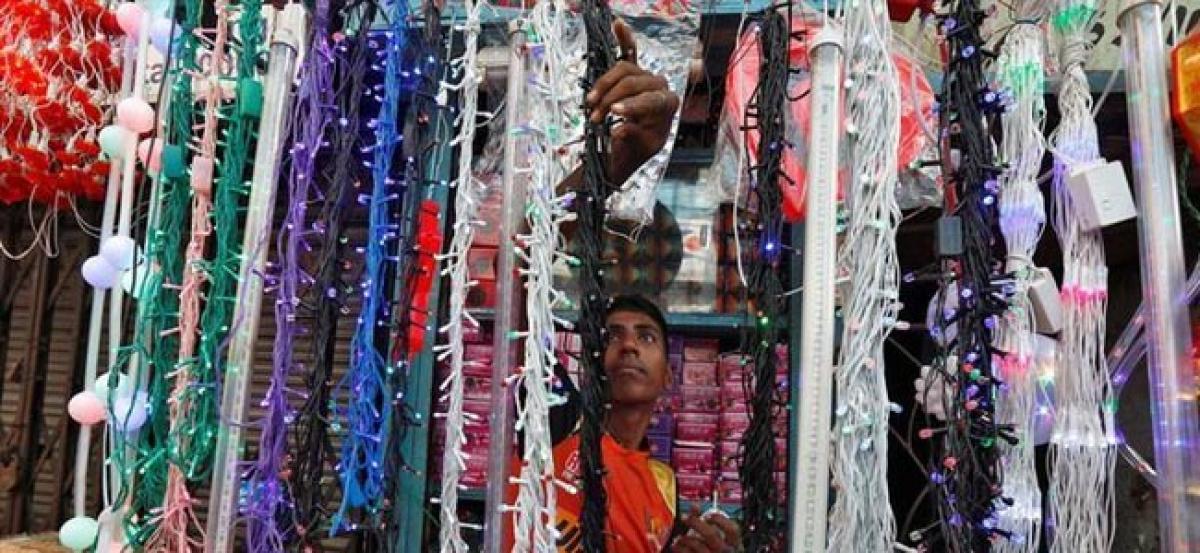Live
- ‘Thandel’ first single ‘Bujji Thalli’ to drop soon
- ‘Thalapathi’ set for grand re-release on Rajinikanth’s 74th birthday
- Shahid Kapoor’s ‘Ashwatthama’ kept on hold due to budget constraints
- ‘Drinker Sai’ teaser: Attracts youth
- Netflix Outage in India and US Ahead of Tyson vs Paul Match
- Police Intensify Investigation into Lagacharla Attack on Officers; Eight More Detained
- Google Docs Introduces AI-Powered Clip Art Generator with Gemini
- LIC sets up stall at India Int’l Trade Fair
- Celebrating journalism and its role in society
- Supporting emotional well-being in children
Just In

Indian markets closed a tad lower than the psychological mark of 8,700 with gains of 1.3 percent at the close of a volatile week.
(Any opinions expressed here are those of the author and not of Thomson Reuters) Indian markets closed a tad lower than the psychological mark of 8,700 with gains of 1.3 percent at the close of a volatile week. The Nifty broke below the lower end of the 8,550 - 8,850 trading range before bouncing back the next day. We are back in the range we have been seeing for the last 13 weeks.
With the rise in the dollar index along with cash-based selling by FIIs in equity markets, the rupee has been under pressure but has so far held on to the 67 per dollar mark. One reason for such resilience could be the sharp appreciation of the rupee against currencies such as the euro, pound and the yen. However, with the Chinese yuan hitting a five-year low against the dollar, the rupee may soon start feeling the heat unless the Reserve Bank of India gets into action.
The beginning of the three-day Goods and Services Tax (GST) council meeting to finalise the tax rates initially triggered positivity in the markets. The government had proposed a new four-tier GST rate structure with standard rates at 12 percent and 18 percent. It had also proposed an additional cess on items currently taxed at a rate higher than the proposed 26 percent, such as tobacco products and luxury cars. However, markets turned cautious as deliberations ended without a decision on the rates structure as most states objected to a proposal to levy an additional cess on ultra-luxury and demerit goods. The finance ministry has set a Nov. 22 deadline for building consensus on all the issues in the council for the rollout of the new indirect tax regime from April 1, 2017. I hope the timelines are met and implementation remains on track.
Banking counters were in the limelight this past week. ICICI Bank surged 15 percent after media reports suggested the debt-laden Essar Group has agreed to sell Essar Oil to a consortium led by Russia's Rosneft. ICICI Bank is among the major lenders to Essar Group and would benefit from the deal’s cash flows.
Also this week, around three million debit cards were compromised in the country’s largest ever security breach that hit 19 banks. Media reports said the vendors’ systems were infested with malware. Although the reported financial loss is minimal, the security breach is a serious issue as India has embraced plastic and electronic money in the last few years. Swift action by stakeholders should control damage and repose faith in the system.
Fitch Ratings expects Indian telecom credit profiles to weaken amid intense competition and high capex requirements in 2017. Pricing power could be eroded as incumbents try to remain competitive with new entrant Reliance Jio's cheaper data tariffs and free voice and text. Most telecom companies’ free cash flow will be negative, as cash generation is likely to fall short of capex requirements. The latest 30 billion rupee fine by TRAI on Bharti, Vodafone and Idea for denying adequate interconnection to Reliance Jio would be another bone of contention for the players. I expect these irritants to continue in the foreseeable future.
On the global front, the European Central Bank left its ultra-loose monetary policy unchanged but kept the door open for more stimulus in December, putting to rest any talk of tapering its 1.7 trillion euro asset-buying programme.
In the coming week, the next batch of quarterly results and global trends are likely to dictate market cues. The mood is expected to remain upbeat as it is the pre-Diwali week. Needless to say, volatility could remain high as it is also the derivative contract expiry week.
Key results expected this week include Adani Enterprises, Axis Bank, Idea Cellular, Reliance Capital, Asian Paints and Bharti Airtel.
The next two weeks are crucial for markets, which have been in 8,550 - 8,850 range for nearly 13 weeks. Now it is narrowing further as markets are unable to cross the 8,700 levels decisively. Simmering tensions on the India-Pakistan border, GST deliberations, the U.S. elections and subsequent Fed action would be events to be closely watched.
The quality of stocks and pace of movement in specific stocks should be a major cause of concern for veteran investors. This market offers a lot of opportunity to traders for a quick entry and exit, but for an investor it’s time to increase cash levels in the portfolio.

© 2024 Hyderabad Media House Limited/The Hans India. All rights reserved. Powered by hocalwire.com







